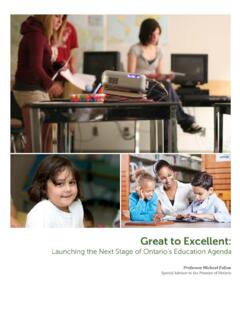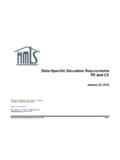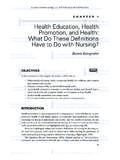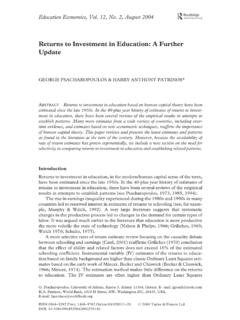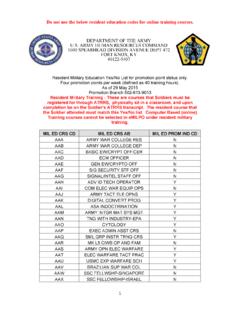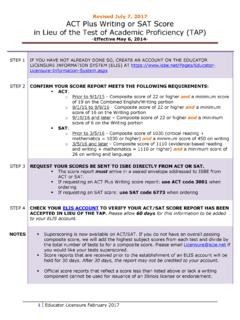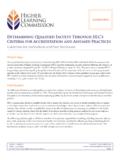Transcription of Education Plus - A Whitepaper, July 2014 - Michael Fullan
1 New Pedagogies for Deep Learning whitepaper : Education plus The world will be led by people you can count on, including you! Authors: Michael Fullan and Geoff Scott Published by: Collaborative Impact SPC, Seattle, Washington july 2014 For more information about New Pedagogies for Deep Learning visit 2014 Collaborative Impact Creative Commons Attribution ShareAlike International License. Education plus The world will be led by people you can count on, including you! Education plus is the hidden dividend that learners come to acquire if they are educated in what we call the new pedagogies powerful new learning modes steeped in real world problem solving now made more telling through recent, rapid developments in the use of technology for interactive learning. We can and will define the core learning outcomes as the Six Cs of Deep Learning', but we first must understand the existential essence of this new human being.
2 It is no exaggeration to say that the new pedagogies have the potential to support a fundamental transformation in human evolution. The result is that action, reflection, learning and living can now become one and the same. This seamless ecology' of life and learning occurs during what we used to know as formal schooling, post secondary and higher Education , but then continues throughout life. In this model, learning, doing, knowing, adapting, inventing and living become practically indistinguishable. Although we offer here a philosophical note on Education plus we are deeply involved with practitioners around the world in doing this new work of learning on an increasingly large and deep scale. The developments we describe are happening in real time, and we predict will take off in the immediate future. There is one big E Squared' that permeates this endless cycle of learning in action: Ethical Entrepreneurialism.
3 This breaks the distinction between being able to work with your hands and your mind and gives a new, deeper meaning to the term entrepreneurial'. In our conceptualization entrepreneurialism is not just about making money but also being able to identify and resolve complex personal and societal challenges locally and globally. For the first time in history the mark of an educated person is that of a doer (a doing thinker; a thinker doer) they learn to do, and do to learn. They are impatient with lack of action. Doing is not something they decide to do daily life is doing, and as natural as breathing air. Along with action is an exquisite awareness of the ethics of life. Small . scale ethics in how they treat others; large scale ethics concerning humankind including building a sustainable future and safeguarding the evolution of the planet. When we change our Education system, and when hordes of people are acting individually and collectively in ethically entrepreneurial ways the world changes, and keeps on changing with built in adaptation and resilience.
4 Another critical foundation point: all of the traits we talk about in this paper the Six Cs and E Squared are both an individual and a collective (or group) phenomenon. Moreover they are synergistic, they feed on each other within the individual and the group. Finally, you have to master all of them miss any one or two and the entire edifice is fundamentally weakened. In K 12 Education we talk now of students becoming basics plus '. In higher Education we talk of graduates not only being work ready' for today but work ready plus ' for tomorrow. What is this plus ? It concerns being sustainability literate (socially, culturally, economically and environmentally); change implementation savvy (being able to engage others in constructive change and make it 3 happen); inventive (being able to create new artefacts, processes, sources of benefit including making valuable things out of waste and creating better ways of working together); and being clear on where you stand on the contestable tacit assumptions driving the 21st century agenda: assumptions like growth is good', consumption is happiness', ICT is always the answer' and globalization is great'.
5 We will spell out the actual capacities known as the Six Cs shortly, but it is crucial to know that if you just focus on the six sets of competencies you will miss the deep meaning of Education plus . The latter is an epiphenomenon it arises from immersion in the Six Cs, and their synergy. It generates a growing realisation that being educated means recognising, appreciating, assessing, reinforcing and cultivating the ubiquitous and powerful nature of ethical entrepreneurialism that is fundamental to this new learning. These qualities are both learnable and assessable. Education plus is, therefore, not simply about learning 21st century skills in isolation from doing, nor is it about acquiring basic skills and knowledge out of context. Instead, it is about collaborative learning through reflection in action and on action in order to become better at negotiating the messy, fuzzy, dilemma ridden context of real world life and work with positive impact.
6 It is about developing an attitude of mind, a set of values and the personal, interpersonal and cognitive capabilities identified repeatedly in studies of successful early career graduates and those leaders who have helped create more harmonious, productive and sustainable workplaces and societies. For us, learning is, therefore, not only the development of the fundamental competencies (skills and knowledge) necessary for the successful negotiation of an uncertain world. It is also about developing the personal, interpersonal and cognitive capabilities that allow one to diagnose what is going on in the complex, constantly shifting human and technical context of real world practice and then match an appropriate response. Our studies of successful early career graduates and of effective, turnaround' leaders in a range of contexts has shown that one's capability as a worker, professional, citizen, parent or spouse is most challenged not when things are going smoothly but when things go suddenly awry or the unexpected happens.
7 It is then that the practitioner's personal, interpersonal and cognitive capabilities are most tested. At times like this it is no good simply to know or be able to do a lot, rather it requires the ability to listen, diagnose and figure out what is really going on and determine, in collaboration with the other key players, how the situation might best be handled and then, with their help, to apply the right mix of knowledge and skills in order to make this happen. In terms of personal capabilities what is repeatedly identified as distinguishing the most effective professional performers and leaders is their ability: to remain calm when things go wrong, to remove their ego from the situation, to practice what they preach', and to demonstrate their authenticity, humility, tolerance for ambiguity, trustworthiness, transparency and commitment to fairness, underpinned by resilience, curiosity, a willingness to persevere and take responsibility for their actions and a sense of perspective and humour about what is happening.
8 4 Concerning interpersonal capabilities what is significant is their ability to listen to all points of view, to work productively with diversity, to engage the disengaged, to show high levels of empathy and effectively read the motivations of others. Learners with the new cognitive capabilities are particularly deft at reading'/diagnosing what is going on in messy situations (that is they are good at problem formation not just at problem solving), at thinking laterally and creatively about solutions, and, like a chess player, at tracing out and evaluating the likely consequences of different potentially relevant courses of action. And they are particularly good at reflecting in and on action in order to learn from their errors. In the context of school Education , Claxton and Lucas's (2013:9) distinction between pro social and epistemic captures these same phenomena: Pro social: kind (not callous); generous (not greedy); forgiving (not vindictive); tolerant (not bigoted); trustworthy (not deceitful); morally brave (not apathetic); convivial (not egotistical); ecological (not rapacious); Epistemic: inquisitive (not passive); resilient (not easily defeated); imaginative (not literal); craftsmanlike (not slapdash); sceptical (not credulous); collaborative (not selfish); thoughtful (not impulsive); practical (not only academic').
9 The pro social qualities concern cultivating the attitudes of a good friend, a good neighbour or a good citizen. The epistemic ones are to do with the qualities of mind of the powerful learner doer: a person who is able to meet difficulty and uncertainty with confidence, capability and enthusiasm. The major challenge for 21st century Education at every level is how to design itself so that it functions, day in, day out, as an effective incubator of its chosen virtues. Taken together these personal, interpersonal and cognitive capabilities identify the underpinnings needed by school and college graduates if they are to build the communities, institutions and indeed the societies that will be socially, culturally, economically as well as environmentally sustainable over the coming years. And these value based capabilities are the engine house of ethical entrepreneurialism.
10 We note, also that, as Bouquet pointed out in Comparative Religion back in 1941 and Merrill E. Bush in Educational Leadership in 1954 they have much in common with the shared values that underpin all of the world's major religions as well as the humanist tradition of many societies. The main difference in our formulation is that values and action merge as doing becomes the centrepiece of learning. We do not spell out the new pedagogies' in this note. Essentially they involve a learning partnership between and among teachers, students, business, community groups and families (see Fullan and Langworthy, 2014, A Rich Seam; our New Pedagogies for Deep Learning partnership ( ) that involves some 1,000 schools world wide; for higher Education , Scott, 2013). We will say that this new learning combats the boredom of traditional schooling and post . secondary Education (both students and teachers are bored), and replaces it with learning environments based on four new criteria in combination.
